
-
 Tucker stars as Ireland crush Oman by 96 runs at T20 World Cup
Tucker stars as Ireland crush Oman by 96 runs at T20 World Cup
-
Rubio tells allies US and Europe 'belong together'
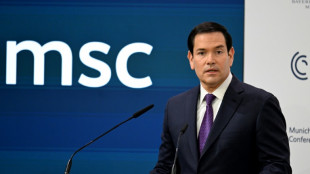
-
 Snowboarding monk in spotlight after S. Korea's Olympic glory
Snowboarding monk in spotlight after S. Korea's Olympic glory
-
Bangladesh's Tarique Rahman poised to be PM as Islamists concede

-
 What does Greenland's mining industry look like?
What does Greenland's mining industry look like?
-
Greenland prepares next generation for mining future
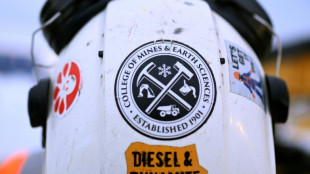
-
 China top court says drivers responsible despite autonomous technology
China top court says drivers responsible despite autonomous technology
-
Sixers rookie Edgecombe leads 'Team Vince' to NBA Rising Stars crown

-
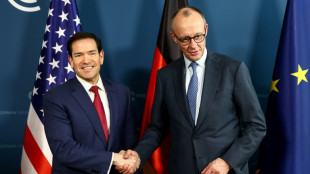 Rubio at Munich security meet to address Europeans rattled by Trump
Rubio at Munich security meet to address Europeans rattled by Trump
-
Medal-winner Sato says Malinin paid for 'toxic schedule'

-
 Carney offers support of united Canada to town devastated by mass shooting
Carney offers support of united Canada to town devastated by mass shooting
-
All-in on AI: what TikTok creator ByteDance did next

-
 Healthy Ohtani has Cy Young Award in sights
Healthy Ohtani has Cy Young Award in sights
-
One of Lima's top beaches to close Sunday over pollution

-
 'Nothing is impossible': Shaidorov shocks favourite Malinin to make history
'Nothing is impossible': Shaidorov shocks favourite Malinin to make history
-
Malinin wilts at Olympics as Heraskevych loses ban appeal

-
 Bhatia joins Hisatsune in Pebble Beach lead as Fowler surges
Bhatia joins Hisatsune in Pebble Beach lead as Fowler surges
-
Malinin meltdown hands Shaidorov Olympic men's figure skating gold

-
 Top seed Fritz makes ATP Dallas semis with fantastic finish
Top seed Fritz makes ATP Dallas semis with fantastic finish
-
Patriots star receiver Diggs pleads not guilty to assault charges

-
 Havana refinery fire under control as Cuba battles fuel shortages
Havana refinery fire under control as Cuba battles fuel shortages
-
Peru Congress to debate impeachment of interim president on Tuesday

-
 Snowboard veteran James targets 2030 Games after Olympic heartbreak
Snowboard veteran James targets 2030 Games after Olympic heartbreak
-
Costa Rica digs up mastodon, giant sloth bones in major archaeological find

-
 Trump says change of power in Iran would be 'best thing'
Trump says change of power in Iran would be 'best thing'
-
Paris police shoot dead knife man at Arc de Triomphe

-
 Japan's Totsuka wins Olympic halfpipe thriller to deny James elusive gold
Japan's Totsuka wins Olympic halfpipe thriller to deny James elusive gold
-
Canada's PM due in mass shooting town as new details emerge

-
 Neto treble fires Chelsea's FA Cup rout of Hull
Neto treble fires Chelsea's FA Cup rout of Hull
-
Arbitrator rules NFL union 'report cards' must stay private

-
 Dortmund thump Mainz to close in on Bayern
Dortmund thump Mainz to close in on Bayern
-
WHO sets out concerns over US vaccine trial in G.Bissau

-
 Skeleton racer Weston wins Olympic gold for Britain
Skeleton racer Weston wins Olympic gold for Britain
-
Ex-CNN anchor pleads not guilty to charges from US church protest

-
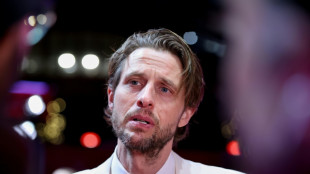 Berlin premiere for pic on jazz piano legend Bill Evans
Berlin premiere for pic on jazz piano legend Bill Evans
-
Fire at refinery in Havana as Cuba battles fuel shortages

-
 A Friday night concert in Kyiv to 'warm souls'
A Friday night concert in Kyiv to 'warm souls'
-
PSG stunned by rampant Rennes, giving Lens chance to move top

-
 Japan's Totsuka wins Olympic halfpipe thriller as James misses out on gold
Japan's Totsuka wins Olympic halfpipe thriller as James misses out on gold
-
Indian writer Roy pulls out of Berlin Film Festival over Gaza row

-
 Conflicts turning on civilians, warns Red Cross chief
Conflicts turning on civilians, warns Red Cross chief
-
Europe calls for US reset at security talks

-
 Peru leader under investigation for influence peddling
Peru leader under investigation for influence peddling
-
Rising star Mboko sets up Qatar Open final against Muchova

-
 Canada PM to mourn with grieving town, new details emerge on shooter
Canada PM to mourn with grieving town, new details emerge on shooter
-
US waives Venezuela oil sanctions as Trump says expects to visit
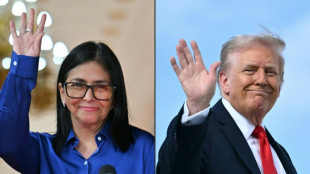
-
 NBA star Chris Paul retires at age 40 after 21 seasons
NBA star Chris Paul retires at age 40 after 21 seasons
-
WTO chief urges China to shift on trade surplus

-
 Vonn hoping to return to USA after fourth surgery on broken leg
Vonn hoping to return to USA after fourth surgery on broken leg
-
Trump sending second aircraft carrier to pile pressure on Iran
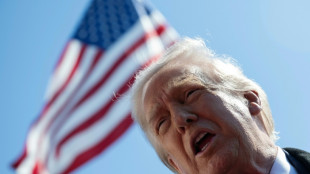

EU faces uphill battle to rein in big tech
The EU's landmark curbs on how tech titans do business online kick in from Thursday, but just how far Brussels succeeds in bringing the giants to heel will hinge on bitter battles that still lie ahead.
Wielding a tough new legal arsenal, Brussels is determined to force a change in behaviour by the world's biggest tech firms, to create a more competitive online field that allows smaller players to flourish.
The bloc's new Digital Markets Act (DMA) will usher in a long list of do's and don'ts for six so-called "gatekeepers" designated by the European Union: Apple, Amazon, Google owner Alphabet, TikTok parent ByteDance, Meta and Microsoft.
"What we need right here from gatekeepers is changing behaviour," the bloc's competition commissioner Margrethe Vestager told AFP in an interview on the eve of the law coming into force.
The big six will have to tell Brussels about any buyout, large or small, as well as provide European users with more choices when they pick web browsers or search engines.
Users should also soon be able to send messages between apps, for example from Meta's WhatsApp to services such as Signal or Telegram.
But experts warn enforcement represents a mighty challenge, and the EU already faces legal challenges, including from Apple, Meta and TikTok.
"Getting big tech to comply with these new rules will be an enormous task," Bram Vranken, researcher at Corporate Europe Observatory, told AFP.
"Even now, almost eight years after the adoption of the GDPR" -- the EU's mammoth data protection law -- "the EU is still struggling in getting Facebook to respect the privacy of millions of people in Europe," Vranken added.
Brussels slapped a 1.2-billion-euro ($1.3 billion) fine on Meta over data privacy violations last year.
Separately, the EU on Monday hit Apple with a more than 1.8-billion-euro fine for violating the bloc's antitrust rules by preventing European users from accessing information about alternative, cheaper music streaming services.
When it comes to DMA enforcement, an EU official admitted to AFP that because of limited resources the European Commission, the bloc's powerful competition regulator would have to "pick and choose" which cases to pursue.
The commission would not comment on the claim.
- 'Underestimating' the challenge -
Senior officials acknowledge it may not be realistic to expect total and instant compliance.
"We will see some compliance, full compliance by some companies. But I do think that there will be non-compliance cases," Vestager told AFP, adding that Brussels would not shy away from tougher action if necessary.
"If you look at our history, we have sort of made it credible that we will use the tools that we have," she said.
The EU's 27 states are pushing the commission to focus resources on enforcement -- with at least nine major laws covering the digital space created since 2019.
Belgium, which holds the rotating EU presidency, "stresses" to member states in a leaked document dated February 19 that there is a "need to prioritise in the coming years effective and efficient implementation" of digital laws.
European tech businesses share this concern: industry sources said they want Brussels to make sure big tech follows the rules, not just propose new ones.
Analysts urge the EU to be realistic about the resources that will require.
"EU lawmakers are vastly underestimating the challenge of implementing and enforcing the recent swathe of digital laws," Zach Meyers, of the Centre for European Reform think tank, wrote in a February report.
- EU 'building up' -
The sheer volume of new laws, Meyers argued, "creates a risk that the Commission and national enforcers will lack the resources to implement them properly."
Vestager has said the commission is "building up" its capacity to tackle non-compliance -- but also acknowledges officials would need to prioritise between cases.
Currently, the commission has 80 staff members working on the DMA, a spokesperson said, while there are 123 full-time employees focused on enforcing the Digital Services Act (DSA), a content moderation law.
By way of contrast, Meta and TikTok said last year they each had more than 1,000 people working on DSA implementation at the time.
Google says that on the DMA alone, "thousands of engineers" are working on compliance.
But competition expert Fiona Scott Morton tempered concerns about enforcement, arguing that it is "always an issue" -- and that the DMA was created with that in mind.
"The law is set up to try to combat that -- by putting the burden on the firms themselves for both complying and explaining how they're complying and proving that they have complied," the Bruegel think tank senior fellow told AFP.
S.F.Warren--AMWN
